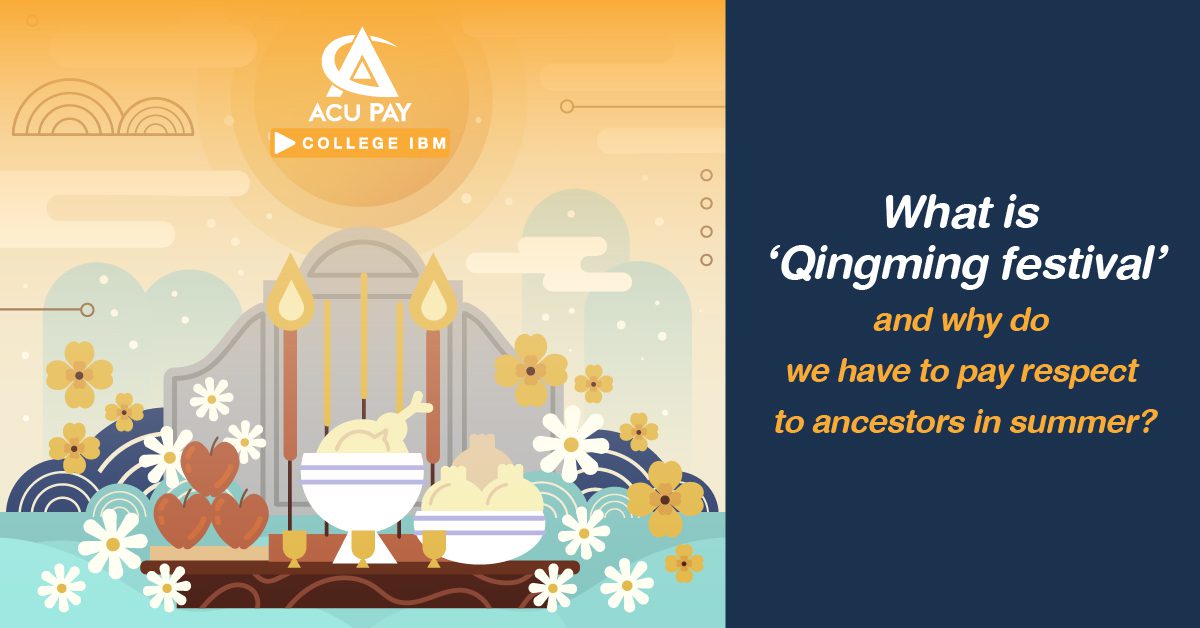

“Qingming” is a festival where Chinese people pay respect to their ancestors at the cemetery or graveyards. In Chinese, “Qing” means clean and pure, and “Ming” means lights.
In the early days, Qingming was not a name for any festivals but it meant the transition from winter to spring which was considered a good and sunny time in China.
Actually, Qingming Festival is divided from 2 festivals; Cold Food Festival (寒食节: Hanshi Jie) and Spring Festival (上巳节: Shangsi Jie)
Cold Food Festival is a fest where people eat cold food without any fire in cooking because in ancient times, fire was an important item in giving warmth and cooking. There was a bonfire in the middle of every village. Any villagers who would like to use fire in cooking would use the fire from the bonfire. However, Chinese people believed that using old things was not good, as well as lighting up a bonfire all the time. Therefore, the bonfire was put out and lit up again every 2 – 3 years.
To put out and light the bonfire which was important to everyone in the villages required auspicious timing. Qingming was a good period since it was not too hot and cold, resulting in the Cold Food Festival.
The Spring Festival was believed that the spirits hibernate during the winter. Therefore, we must raise the spirits to tell them to come up for the offerings sent to them by their children.
Although it was initially divided into two festivals, with the era changing, the two festivals gradually merged into a new festival called “Qingming”.
It officially began during the Tang Dynasty and spread to the general public during the Song Dynasty until it became the Qingming where Chinese descendants would worship their ancestors today.
Since the Qingming festival is in clear and sunny weather, the fresh air and blooming spring flowers mark the beginning of warm spring and the beginning of farm work, Chinese people in those days considered this period as a good time to pay homage to their ancestors at graveyards instead of paying respect at the spirit signs in their homes.
In addition, when the worship is finished, people have to go on a nature tour called “Sightseeing”, which people will travel 10 days before or after the Qingming. It is an activity that has existed since the Song Dynasty (1503-1822 B.E.) and is popular with the general public.
Since then, the Chinese have migrated to the sea to resettle in places where the climate is different from that of China, such as Thailand, making the “Qingming Festival” in this country to endure the scorching sun as well.
As mentioned, “Qingming Day” is a memorial day of the virtues that our ancestors had done, cared for, and hard to keep you well, and being a model of life. “We are comfortable because our parents and ancestors are hardworking”. Ancestor worship is also a social gathering in front of relatives, building unity, and also a reminder for themselves that death must befall everyone, and it is human nature to be born and lost.
These are all the origin, history, and importance of the “Qingming Festival,” the ancestor worship day of the Chinese people and Thai people of Chinese descent, giving us a sense of the reason why paying respect to ancestors takes place in the summer.

ให้ทุกเรื่องการเงินเป็นเรื่องง่าย เริ่มต้นวันดีๆ ไปกับเรา MAKE A GREAT DAY WITH ACU PAY